¡HI! If you want to propose us a project, send a mail to info@albatian.com


ALL INFORMATION ABOUT
BPM, PROCESS, R & D, TECHNOLOGY
More than 66% of BPM employment is not covered due to lack of professionals
By: Pedro Robledo, BPM process management expert
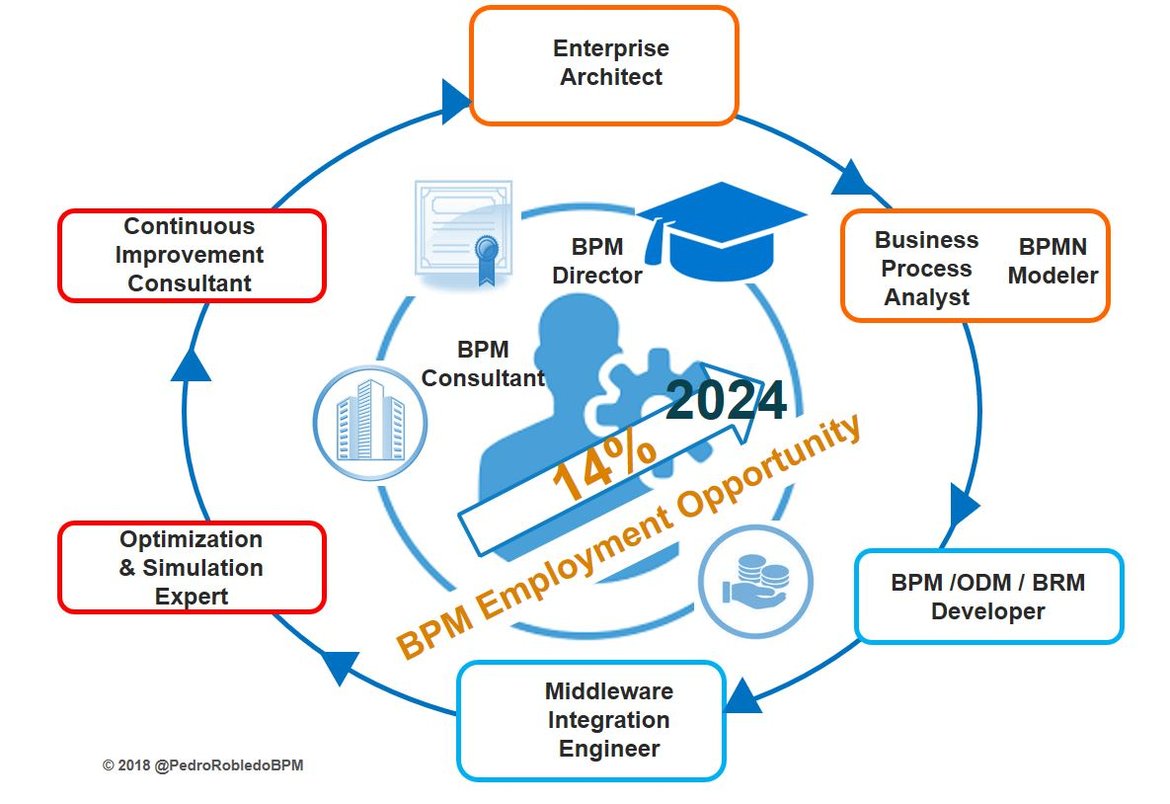
BPM, Business Process Management is a key Management Discipline in all companies that look for Operational Excellence. In the current Digital Revolution, companies must make a Digital Transformation to remain competitive and not disappear. The Digital Transformation requires modifying the Company's Value Chain, therefore, forces companies to redefine their business processes. Being BPM key for these organizations and needing BPM professionals to participate in these process innovation initiatives. In addition, the emergence of disruptive BPM technologies will benefit the implementation of the BPM discipline in organizations from now on. The BPM industry has continued its growth of two digits during the past year, responding to the corporate need for better process management in continuous improvement, optimization, governance, risk mitigation, regulatory compliance, cost savings, customer experience, business collaboration and digital transformation initiatives. Growth will be greater in 2018 (+18%) as BPM becomes even more important for companies in their day-to-day operations that require an unprecedented dynamism, where innovation must be continuous to be competitive, where the analysis of information is crucial and where it is necessary to act with agility and flexibility to meet the needs of customers - this is why BPM is needed even more by companies in 2018.
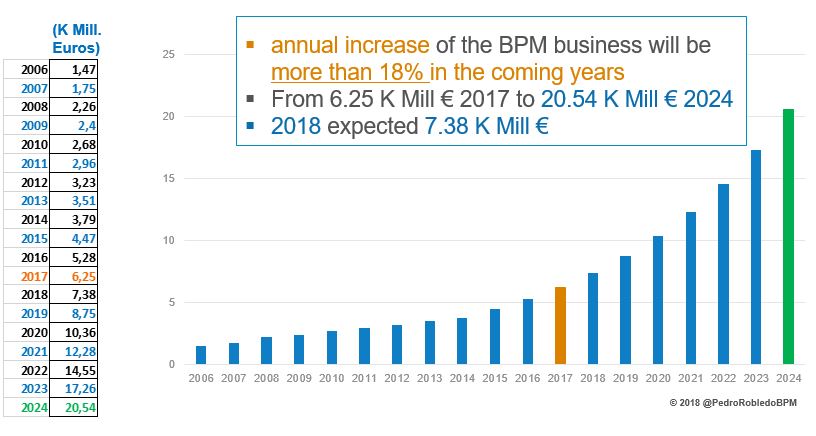
The true picture of process automation is starting to change with the arrival of disruptive and smarter technologies applied to BPM initiatives. They will drive the next wave of disruption, agility and productivity in the digital company and they will lead to great advances in all organizations. In Triaster's blog, I explain my top 10 Business Process Management trends which highlight both strategy and the hottest technologies that aren't yet widely implemented in BPM initiatives but that will have a greater impact and significant potential for disruption in 2018.
Currently more than 66% of the jobs needed in Business Process Management (BPM) cannot be covered, according to my recent study "BPM Employment Opportunities in 2017". And this number will continue to grow because the annual increase of the BPM software market will be over 18% in the coming years. 85% of the organizations will need more professionals to improve the transversal processes of their value chain due to the digital transformation and the applications of disruptive technologies in the business processes.
In this research, I have analyzed the current situation of the BPM market at the employment level, what opportunities exist, where they are and what salary levels are being offered. So, next, I will explain the main conclusions. The method is based on searching for job openings in more than twenty main job search engines from around the world during 2017, conversations with BPM recruiters and an analysis of the main consultancy companies, since they demand 60% of the current job offer to satisfy their clients. The research reveals that the number of BPM job offers in 2017 has increased by 10% compared to 2016, and a growth of 14% is expected for 2024.
In general, there are few BPM human resources in companies dedicated to BPM initiatives or operational excellence. 53% of the organizations have one or two full-time workers, and only 12% have more than five. Consequently, this reflects upon the fact that only 26% of organizations in all geographies have a BPM Center of Excellence structure for the BPM government. Oriented Process Companies are incorporating a BPM Director or Chief Process Officer (CPO), its rate having doubled since 2011. Most companies require more internal BPM personnel, and in 75% they want external professional consultants with profiles throughout the BPM life cycle, which allow them to accelerate the implementation of BPM in their organizations. It is usual for organizations to hire an interim adviser to manage them in the implementation of BPM. Currently, the offer focuses on 44% of BPM job positions in the IT department, 33% in BPM team/office (CoE BPM) and 23% in positions dedicated to continuous improvement and process optimization.
The gender parity in the BPM positions in the organizations is not yet achieved, being 23.6% occupied by women and 76.4% by men. According to the reports of female students in STEM technology careers (Science, Technology, Engineering, Mathematics), this is a difficult situation to change, although it can improve thanks to the female interest in business positions (process analyst, BPMN modeler and improvement consultant keep going).
The most demanded job positions of the BPM Life Cycle are still those positions related to the implementation of BPM using a BPM engine and middleware integration: the Integrator Middleware Engineer (23%) and BPM Developer (21%). Followed by positions oriented towards process analysis and optimization or continuous improvement: Business Process Analyst (14%) and Business Improvement Manager (14%). It should be noted that 79% of jobs require BPM consultants in the different roles involved in the BPM life cycle.
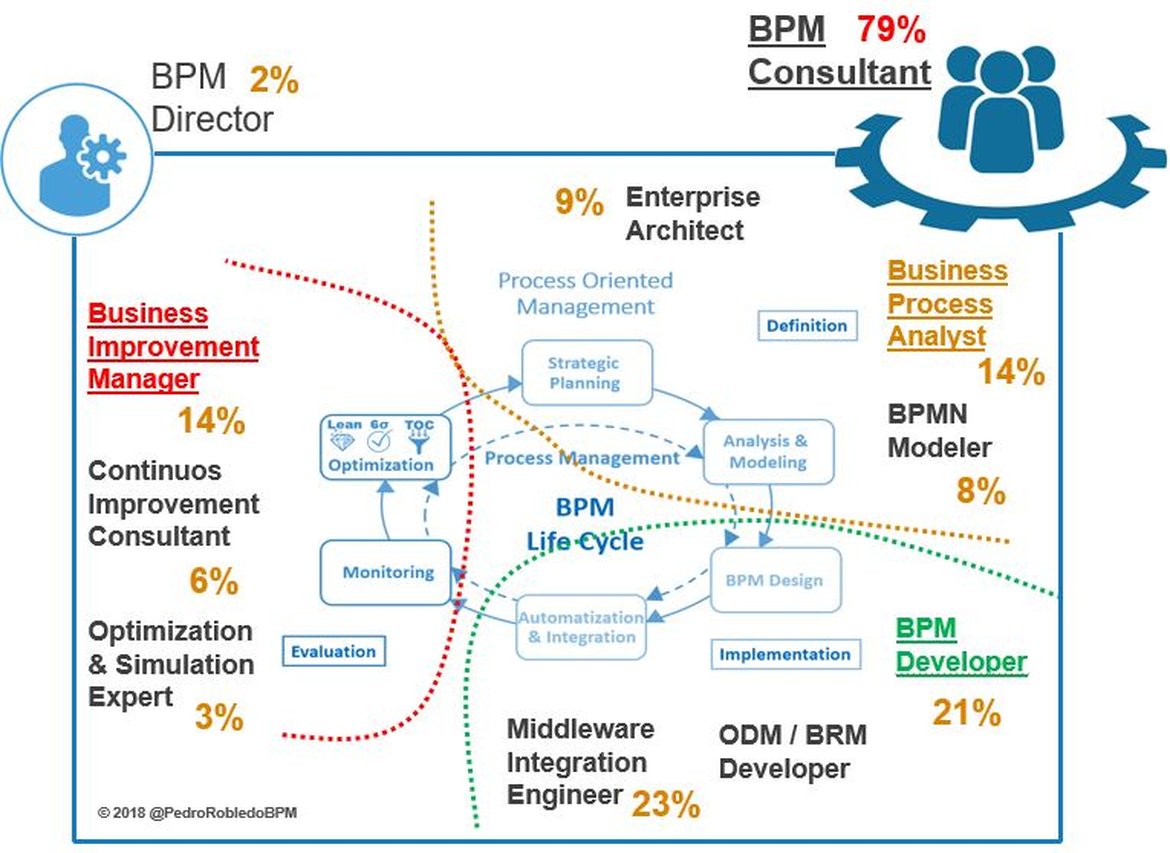
The average salary of BPM jobs remains constant regarding previous years’ salaries despite the need for professionals. The average yearly salary of BPM consultants ranges from 35,000 to 136,000 euros, depending on the role they perform in their consulting service. The BPM Director currently has a salary between 45,000 to 138,000 euros per year, the Business Architect (40k - 110k), the Business Process Analyst (25k-80k), the Process Modeler in BPMN (20k-60k), the BPM Developer (20k - 60K), the ODM / BRM Developer (20k-60k), the Middleware Integrator (30k-80k), the Optimization and Simulation Expert (39k-80k), the Continuous Improvement Consultant (39k-119k) and the Continuous Improvement Manager (39k-175k). These salaries, depending on the geographical area, are increased or decreased considerably. The average salary is around 45,500 euros per year, with salaries in Spain being 16% lower, in the USA 32% higher, in Switzerland 90% higher, in Latin America from 24% to 57% lower and in the India 81% lower.
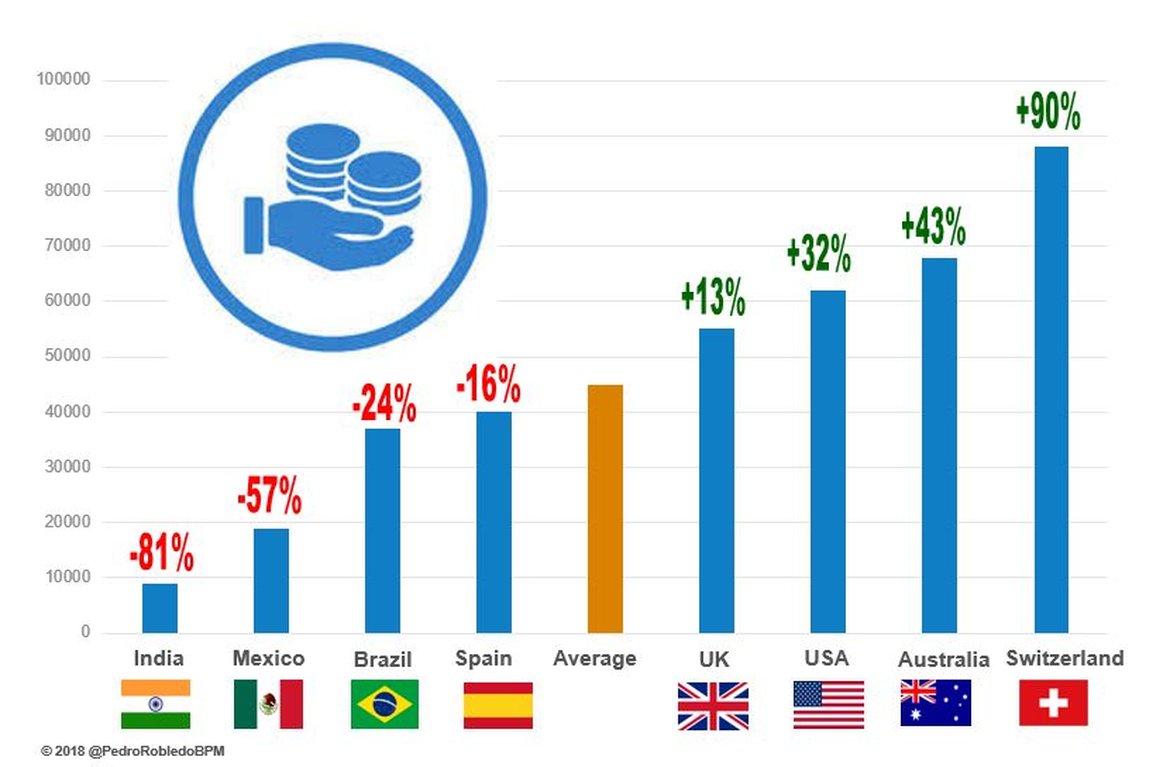
Regarding the most demanded BPM software knowledge in job offers are Tibco (32%, mainly due to the demand for middleware integration), Software AG (15%, 70% BPM and 30% ARIS), Oracle (13%), IBM (11%), Pega (10%), Bizagi (7%), Appian (5%) and Auraportal (3%). Others with lower percentages, such as Opentext, BoC, Bonitasoft, K2, iGrafx, Ultimus, Agilepoint, PNMsoft and BPlogix, add up to the remaining 4%.
All over the world, professionals with BPM technological knowledge are needed. The geographical regions where there has been the highest volume of BPM job offers have been the following: USA (50%), India (8%) and Australia (6%). Other areas with volume to consider are UK, Mexico, Spain, Ecuador, the Philippines, Germany, Russia, Canada, Peru and Chile, which reflect the increase of BPM initiatives in these countries.
As for the required work experience, the offers that request candidates between 1 and 4 years of BPM experience have had the highest volume (49%), followed by those between 5 and 9 years (26%). The offers of first job along with those of less than 1 year of experience add up to 15%, and consultants with more than 10 years of experience add up to 9%.
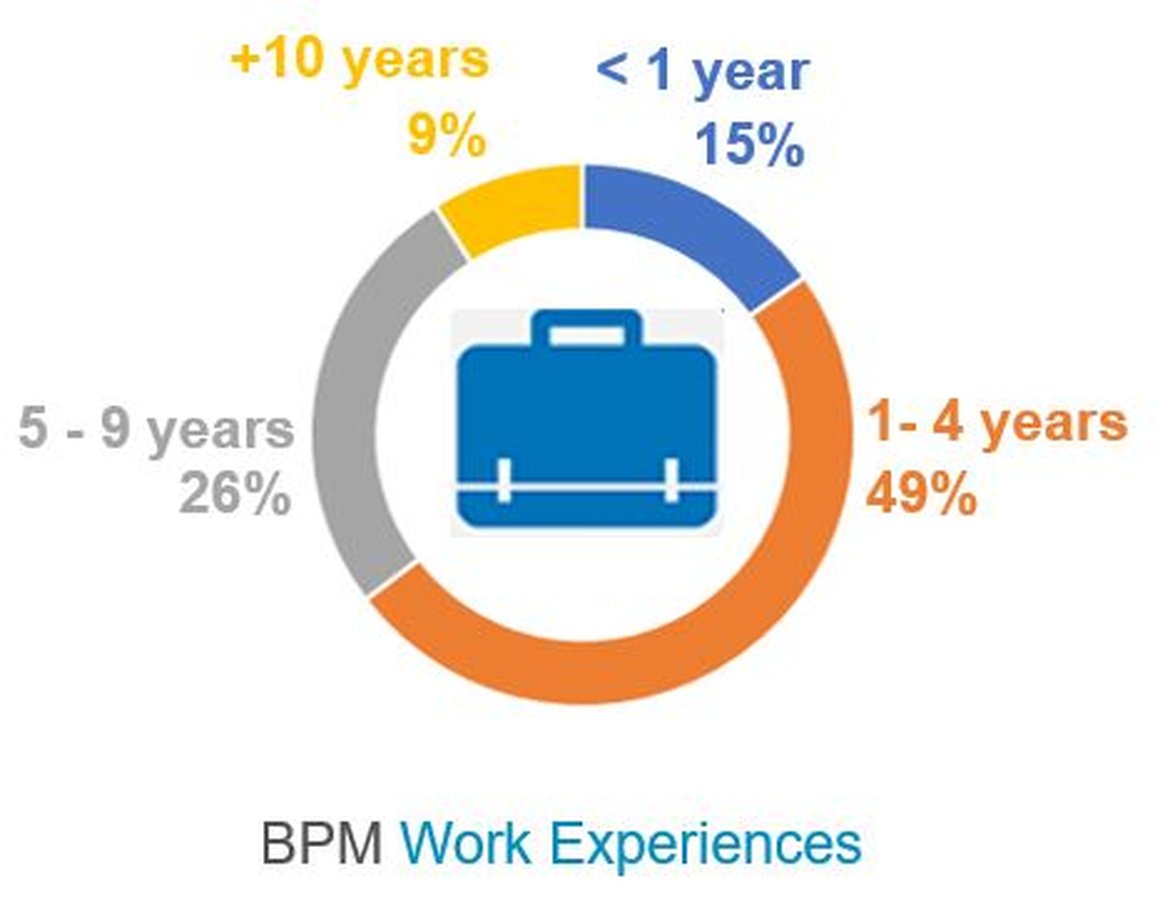
The most frequent type of contract offered in this period was the indefinite (52% of all the offers), which is an increase of two percentage points over the previous year, followed by the temporary (30%), freelance (15% ) and 3% being other types of contracts.
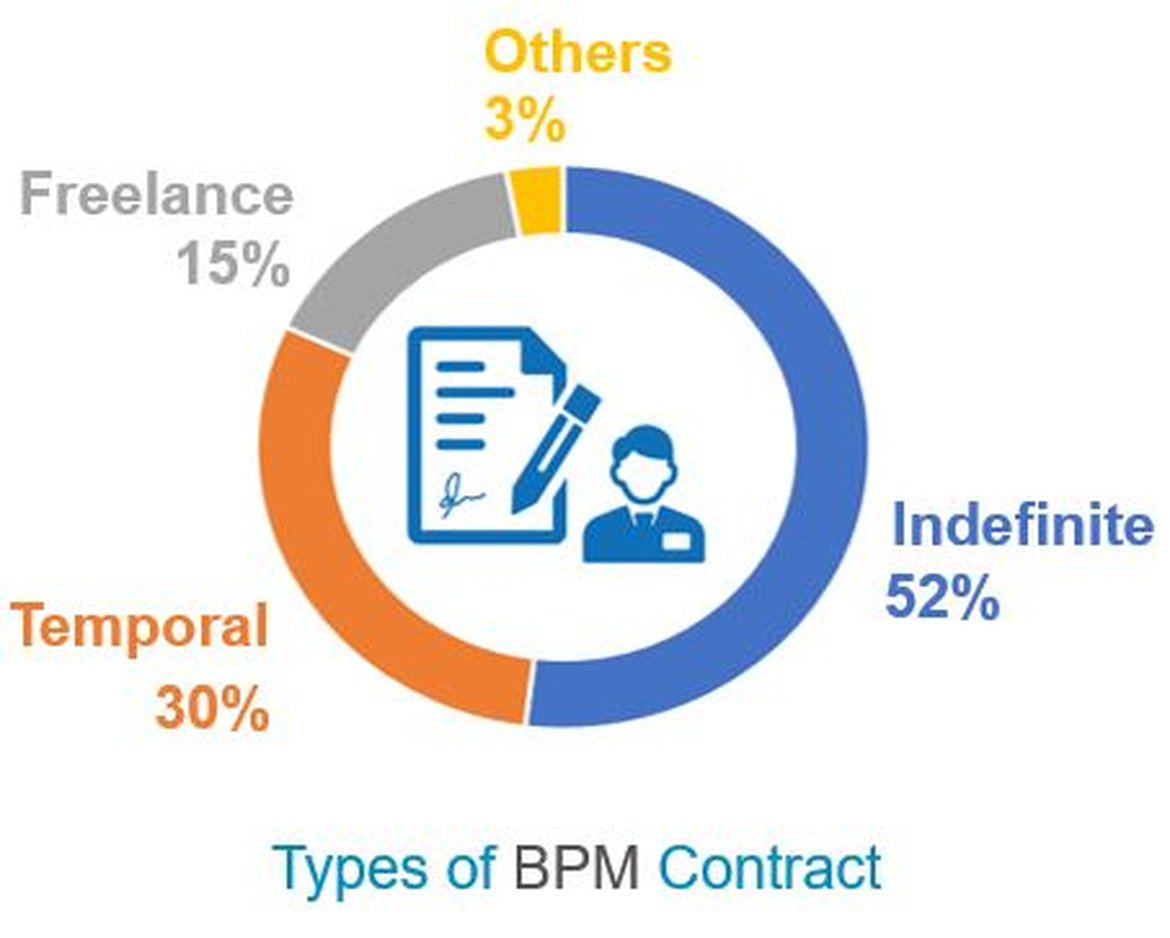
Regarding the profile of professional certification demanded from candidates, 44% of the offers require CBPP or OCEB certifications, 36% require a University Degree in BPM and the other 20% requests other certifications mainly related to specific BPM software solutions.
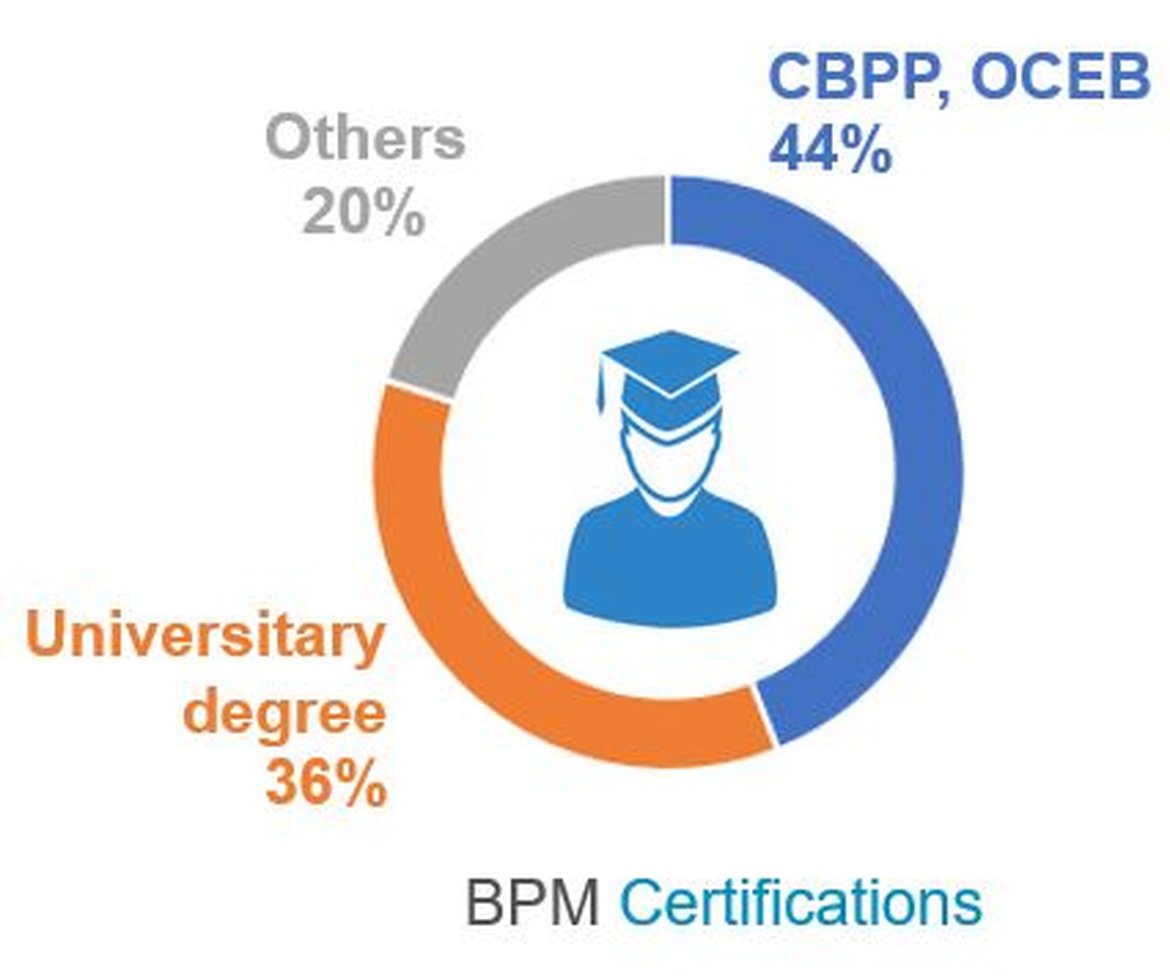
Therefore, the study confirms that many professionals with certified BPM technology knowledge are needed around the world. The increase in BPM initiatives, boosted by the need to redesign processes in the digital transformation of organizations, predicts growth of the BPM software market by 18%. More than 66% of BPM employment is not covered due to lack of professionals, and may cause a delay in the implementation of BPM in the affected companies. As BPM employment will continue to grow up to 14% in 2024, it is a great opportunity to develop your professional career in Business Process Management.
RELACIONADO
-
A strong Enterprise Architecture practice will help prepare organizations for GDPR
by 4 Sept. 18, 2017
-
Where to learn BPM in the University?
by 4 Nov. 2, 2018
-
Industry 4.0: the bpm challenge
by 4 July 9, 2017
-
Not enough with an independent Management of a Process
by 4 May 9, 2017
-
BPM is key to the Digital Transformation
by Albatian Oct. 4, 2016
-
BPM is the most effective discipline of business management
by Albatian Sept. 15, 2016
-
How to guide organizations in Maturity in BPM?
by 4 March 16, 2019
-
Knowledge management and human component of BPM projects
by Albatian Feb. 19, 2013











